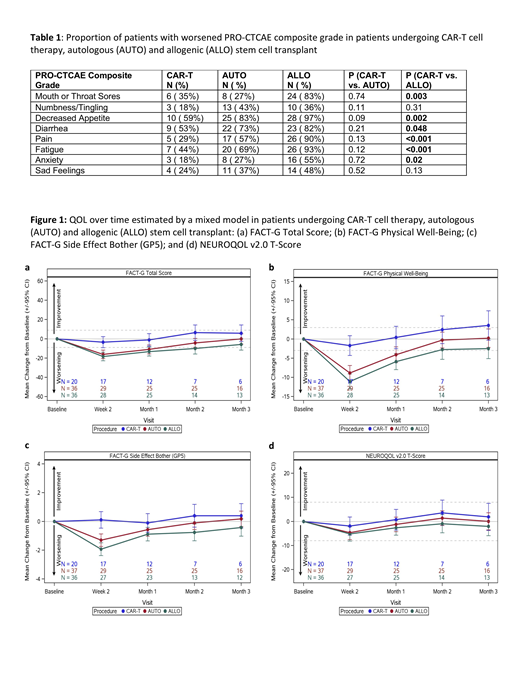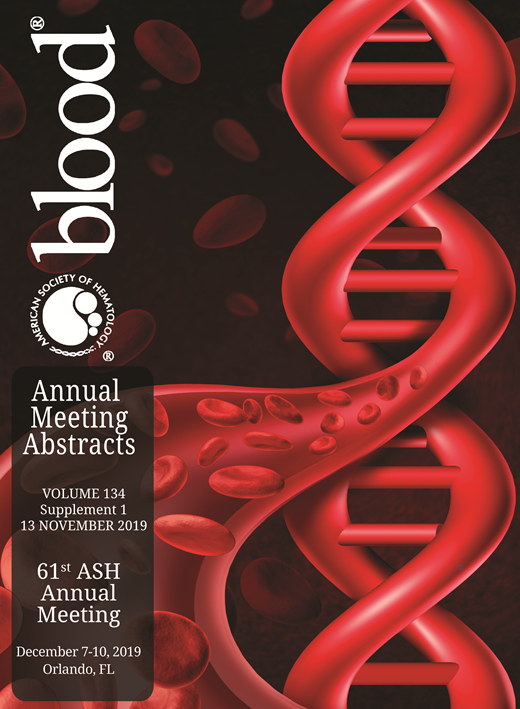Introduction: With the expanding use of CAR-T cell therapy, which is associated with serious adverse effects (AEs), there is a need to characterize the patient's experience over time to guide patient/provider education, and help optimize symptom management. This study reports on longitudinal evaluation of patient-reported quality of life (QOL) and symptom burden of CAR-T cell therapy compared with established forms of cellular therapy i.e autologous stem cell transplant (autoSCT) and allogeneic SCT (alloSCT).
Methods: Patients with hematologic malignancies were prospectively recruited in three cohorts: CAR-T, autoSCT and alloSCT. The primary endpoint was change in QOL from baseline, using the FACT-G questionnaire. Secondary endpoints were patient-reported AEs (PRO-AEs) using 7 items from the PRO-CTCAE and assessment of cognition/memory using the NeuroQOLv2 questionnaire. PRO-CTCAE data was graded using a composite score (combining frequency, severity, and interference) and rates, using a method adjusting for pre-existing baseline symptoms, were compared using Fisher's exact test. We also evaluated the time profile of PRO-AEs using the Toxicity over Time (ToxT) approach, a longitudinal approach to AE analysis (Thanarajasingam Lancet Onc 2016). Patients completed questionnaires at baseline, week 2 and monthly thereafter.
Results: From 07/2018 to 06/2019, 93 patients were recruited (CAR-T: 20; autoSCT: 37; alloSCT: 36). At data cut-off, week 2 and months 1, 2 and 3 data were available in 74, 62, 46 and 35 patients, respectively. There was no difference in patient age across the 3 groups (median age 63, range 23-77; p=0.26). Baseline QOL by FACT-G total score (mean=83.4, SD=14.7; p=0.77), side effect bother by FACT-G GP5 (66/93 [71%] a little bit or less; p=0.72), activities and function (70/93 [75%] fairly normal activities or no limitations; p=0.68) and cognition by NeuroQOL t-score (mean=52.2, SD=8.13; p=0.39) were similar across 3 groups at baseline.
The CAR-T group experienced significantly less worsening in QOL (FACT-G) than both autoSCT and alloSCT groups (Fig. 1a). Worsening in overall QOL nadired at week 2, after which QOL gradually returned to baseline in all groups. When comparing changes from baseline in overall QOL, statistically significant differences between groups were evident at week 2 (CAR-T vs autoSCT p<0.001; vs alloSCT p<0.001), month 1 (CAR-T vs autoSCT p=0.02; vs alloSCT p=0.003), month 2 (CAR-T vs autoSCT p=0.02; vs alloSCT p=0.001) and month 3 (CAR-T vs autoSCT p=NS; vs alloSCT p=0.03). Results for physical (Fig. 1b) and functional well-being (WB) were similar, with significantly less QOL worsening at week 2 in CAR-T vs autoSCT and alloSCT groups.
The most common PRO-AEs (Table 1) in the CAR-T group were decreased appetite (59%), diarrhea (53%) and fatigue (44%). There was no statistically significant difference in the PRO-AEs between CAR-T and autoSCT groups. However, patients undergoing alloSCT had significantly higher proportion of PRO-AEs vs the CAR-T group, except for neuropathy and sad feelings. AutoSCT and alloSCT groups had significant worsening of FACT-G side effect bother (GP5) at week 2, which was significantly different from that of the CAR-T group, following which the side effect bother gradually returned to baseline. (Fig. 1c)
This was the first application of ToxT to PRO-CTCAE data (graphs not shown). Bar charts of maximum grade frequency and stream plots of mean grade over time demonstrate that mouth sores, fatigue, diarrhea and decreased appetite peak at week 2 and improve by month 3, and are of lesser severity in the CAR-T vs autoSCT and alloSCT groups. The trajectory of maximum grade across all PRO-AEs was similar by group as overall side effect burden by FACT-G GP5. Heatmap visualization demonstrated significant intra-patient variability and allowed inspection of data completeness.
No difference in cognition and memory was observed across the three groups over the first three months. (Fig. 1d)
Conclusion: This study is the first to our knowledge to provide comprehensive PRO data comparing QOL, patient-reported AEs and cognition in CAR-T cell therapy vs. auto- and alloSCT, and the first application of ToxT to PRO-CTCAE data. Short-term QOL, including physical and functional WB domains was better in the CAR-T group vs. SCT groups. These data can serve as a guide for patient education and symptom management in CAR-T cell therapy.
Co-senior authors: SKK & ACD
Paludo:Celgene: Research Funding; Celgene: Research Funding; Verily Life Sciences: Research Funding; Verily Life Sciences: Research Funding. Gertz:Johnson and Johnson: Speakers Bureau; Celgene: Consultancy; Appellis: Consultancy; Amyloidosis Foundation: Research Funding; DAVA oncology: Speakers Bureau; Physicians Education Resource: Consultancy; Amgen: Consultancy; Janssen: Consultancy; Abbvie: Other: personal fees for Data Safety Monitoring board; Medscape: Consultancy, Speakers Bureau; Prothena Biosciences Inc: Consultancy; Teva: Speakers Bureau; Research to Practice: Consultancy; Annexon: Consultancy; Alnylam: Consultancy; International Waldenstrom Foundation: Research Funding; Ionis/Akcea: Consultancy; Spectrum: Consultancy, Research Funding; i3Health: Other: Development of educational programs and materials; Pharmacyclics: Membership on an entity's Board of Directors or advisory committees; Proclara: Membership on an entity's Board of Directors or advisory committees; Springer Publishing: Patents & Royalties. Dispenzieri:Akcea: Consultancy; Intellia: Consultancy; Janssen: Consultancy; Pfizer: Research Funding; Takeda: Research Funding; Celgene: Research Funding; Alnylam: Research Funding. Ansell:Trillium: Research Funding; LAM Therapeutics: Research Funding; Mayo Clinic Rochester: Employment; LAM Therapeutics: Research Funding; Seattle Genetics: Research Funding; Affimed: Research Funding; Regeneron: Research Funding; Trillium: Research Funding; LAM Therapeutics: Research Funding; Seattle Genetics: Research Funding; Regeneron: Research Funding; Seattle Genetics: Research Funding; Mayo Clinic Rochester: Employment; Regeneron: Research Funding; Bristol-Myers Squibb: Research Funding; LAM Therapeutics: Research Funding; Bristol-Myers Squibb: Research Funding; Trillium: Research Funding; LAM Therapeutics: Research Funding; Regeneron: Research Funding; Mayo Clinic Rochester: Employment; Seattle Genetics: Research Funding; Affimed: Research Funding; Bristol-Myers Squibb: Research Funding; Bristol-Myers Squibb: Research Funding; Bristol-Myers Squibb: Research Funding; Regeneron: Research Funding; LAM Therapeutics: Research Funding; LAM Therapeutics: Research Funding; Trillium: Research Funding; Seattle Genetics: Research Funding; Regeneron: Research Funding; Regeneron: Research Funding; Regeneron: Research Funding; Trillium: Research Funding; Seattle Genetics: Research Funding; Seattle Genetics: Research Funding; Trillium: Research Funding; Trillium: Research Funding; Trillium: Research Funding; Mayo Clinic Rochester: Employment; Mayo Clinic Rochester: Employment; Regeneron: Research Funding; Affimed: Research Funding; Trillium: Research Funding; Mayo Clinic Rochester: Employment; Affimed: Research Funding; Mayo Clinic Rochester: Employment; Seattle Genetics: Research Funding; Mayo Clinic Rochester: Employment; Mayo Clinic Rochester: Employment; Affimed: Research Funding; Seattle Genetics: Research Funding; Bristol-Myers Squibb: Research Funding; LAM Therapeutics: Research Funding. Bennani:Bristol-Myers Squibb: Research Funding; Bristol-Myers Squibb: Research Funding; Adicet Bio: Other: Advisory board; Adicet Bio: Other: Advisory board; Purdue Pharma: Other: Advisory board; Purdue Pharma: Other: Advisory board; Seattle Genetics: Other: Advisory board; Seattle Genetics: Other: Advisory board; Seattle Genetics: Other: Advisory board; Kite Pharma: Other: Advisory board; Adicet Bio: Other: Advisory board; Kite Pharma: Other: Advisory board; Bristol-Myers Squibb: Research Funding; Kite Pharma: Other: Advisory board; Purdue Pharma: Other: Advisory board. Kumar:Takeda: Research Funding; Celgene: Consultancy, Research Funding; Janssen: Consultancy, Research Funding.
Author notes
Asterisk with author names denotes non-ASH members.


